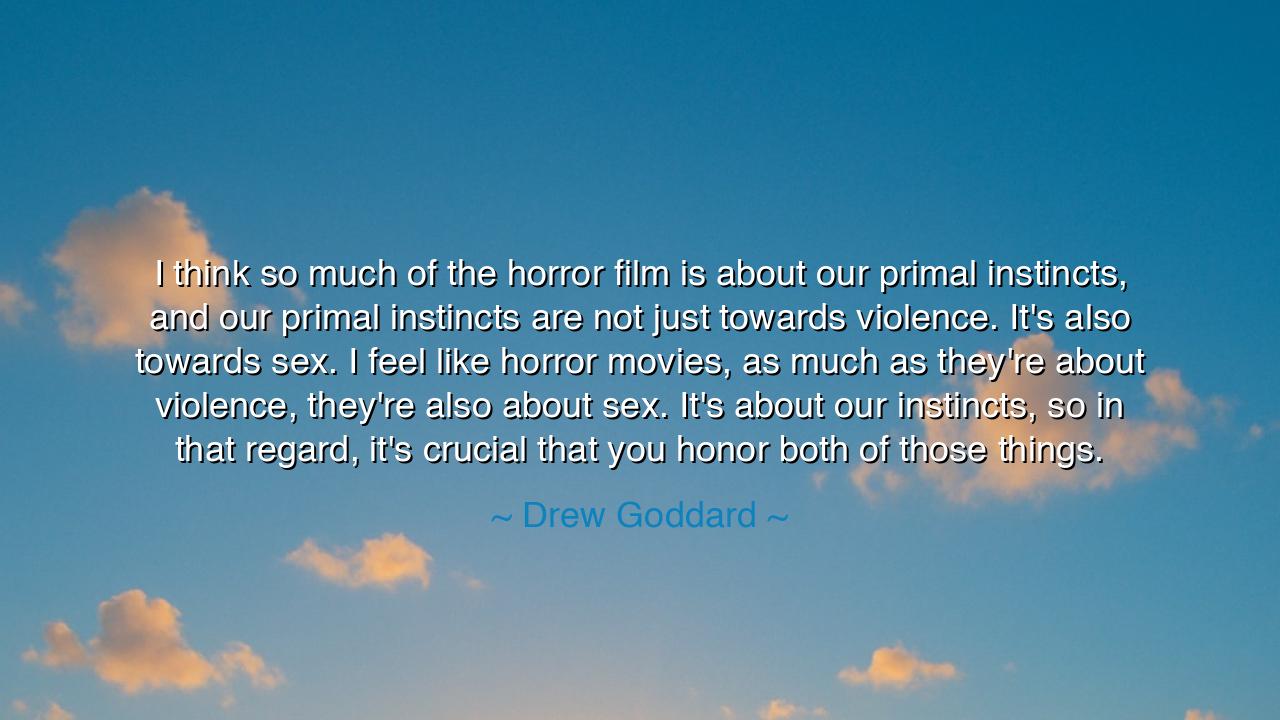
I think so much of the horror film is about our primal
I think so much of the horror film is about our primal instincts, and our primal instincts are not just towards violence. It's also towards sex. I feel like horror movies, as much as they're about violence, they're also about sex. It's about our instincts, so in that regard, it's crucial that you honor both of those things.






Hear me now, O seekers of wisdom, for I bring forth a reflection on the ancient forces that shape our lives—violence and sex, two primal instincts that stir the depths of our being. Drew Goddard, a creator of powerful narratives, once spoke these words: "I think so much of the horror film is about our primal instincts, and our primal instincts are not just towards violence. It's also towards sex. I feel like horror movies, as much as they're about violence, they're also about sex. It's about our instincts, so in that regard, it's crucial that you honor both of those things." In these words, Goddard unveils a profound truth about the human condition—the way in which these forces, so deeply embedded in our nature, shape the stories we tell and the fears we confront.
In the world of horror, we confront the rawest, most primal elements of existence. Violence, in its many forms, is the outward manifestation of human rage, fear, and power. Yet, Goddard reminds us that horror films are not merely about bloodshed and terror; they also tap into the sexual instincts that are equally primal. The fear of death is inextricably linked to the desire for life, and so too are violence and sex intertwined in our deepest fears and desires. This duality of our instincts—the drive to destroy and the drive to procreate—forms the very core of many horror narratives, where these forces often clash, creating a tension that speaks to our very survival as creatures bound to this earth.
Consider the ancient mythologies of the gods, whose very lives were shaped by violence and sex. The great stories of Zeus in Greek mythology, for example, are filled with both these primal forces. Zeus, the king of the gods, is often depicted wielding violence to maintain his rule and protect the heavens. Yet, he is equally infamous for his sexual exploits, engaging with mortals and immortals alike in a way that speaks to the power of desire and dominion. In these stories, we see how violence and sex are not opposites but forces that coexist and shape the very fabric of human existence. Just as Goddard recognizes, horror films echo these ancient narratives, where our most visceral fears and desires clash in a dance that both terrifies and captivates us.
In a more modern context, we can look to Frankenstein, that great gothic horror created by Mary Shelley. The tale of Victor Frankenstein and his monstrous creation is not only about the terror of unnatural life but also about the sexual desire that drives human ambition. Frankenstein’s monster, created in a forbidden act of scientific curiosity, embodies the fear of unchecked creation, of life being brought forth through unnatural means. This is a fear rooted in both violence and sexuality—the creation of life through violent means, and the implications of such a creation for human morality and nature. Shelley’s work, like many horror stories, intertwines these primal instincts, reflecting the complex ways in which they shape our understanding of the world.
Goddard’s insight challenges us to recognize that these primal forces are not just the stuff of horror but are woven into the very fabric of humanity. The ancient Greeks understood that violence and sex were not just external acts but internal struggles that define who we are as beings. The great warriors and heroes of their myths, like Achilles, often found themselves torn between honor and rage, while their passions and desires guided their actions as much as their moral compass. Similarly, the horror films that Goddard refers to expose these same tensions, where sexuality and violence collide and create powerful narratives that tap into the deepest fears and desires of the human heart.
In your own life, O children of wisdom, understand that violence and sex, though often seen as opposing forces, are integral to the human experience. These primal instincts shape our actions, our desires, and our very existence. Yet, as Goddard wisely notes, it is essential to honor both, to understand that they are not merely forces to be feared but aspects of ourselves that, when understood, can lead us toward greater self-awareness. Just as the ancient myths sought to explain the balance of these forces, so too must we seek a balance in our own lives, acknowledging the power and danger of both violence and desire and finding ways to channel them constructively.
So, O seekers, take this lesson to heart: do not shy away from the primal instincts that reside within you. Understand that violence and sex are not external forces but integral parts of your nature. Like the ancient stories, the art of horror asks us to confront these aspects of ourselves, not in fear but in understanding. By honoring both life’s creation and destruction, we can gain a deeper understanding of ourselves and the world around us. Goddard’s wisdom encourages us to embrace this duality, for in doing so, we find the true power of the human spirit—one that can navigate both the light and the dark with grace, understanding, and the courage to face what lies within.






AAdministratorAdministrator
Welcome, honored guests. Please leave a comment, we will respond soon